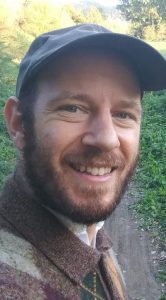We’re thrilled to introduce everyone to Yair Haendler, who has joined the Rutgers Linguistics department as a postdoctoral researcher with Professor Mariapaola D’Imperio.
Here is a brief note Yair kindly wrote for us to learn more about him :
Hi, my name is Yair Haendler and I’m a new postdoc at the Linguistics Department. I was born in Israel, did my undergraduate studies in foreign languages and linguistics in Italy (started in Florence, then completed my degree in Rome), then got married and moved in 2010 with my Italian wife to Berlin. I did an M.Sc. at the University of Potsdam in a program focusing on experimental linguistics, and then continued to a PhD in Cognitive Science that I completed in 2017. From there we moved to Paris, where I did my first postdoc at Université de Paris (it used to be Diderot University, or Paris 7). Now we managed to physically move to the US to start this new postdoc at Rutgers, and although work is only virtual for now, I’ve been enjoying it very much and I’m looking forward to meeting everyone in person.
When people get confused about this story – an Israeli-Italian couple who lived in Berlin, then Paris and now NJ – my wife says: “my husband is a linguist”, and people say Ah! and nod as if with this piece of information makes sense of everything.
I love languages and I’m passionate about how they work and how people use them. I don’t think I’m attached to any field of linguistics in particular. In my PhD I worked on relative clause processing in children (using eye-tracking); in my Paris job I worked on sentence processing in adults and on a minority language called Pomak; now I’m here working on the processing and perception of intonation meaning.
In the past couple of years I came to be passionate also about the process of how we derive conclusions from the data we collect and observe in linguistic experiments. I became interested in understanding better the statistical analysis methods, how to do them more appropriately and what they actually tell us. This made me also a researcher who follows first and foremost the data, rather than a particular theoretical framework. In other words, I’d rather take any given theoretical framework and try to make it fit to the data, rather than the other way round.
In my free time I like to listen to classical music (especially Beethoven’s piano sonatas). I miss going to live concerts, restaurants, meeting friends carelessly, travelling freely to a calm Italian beach in the early summer. But even in these hard times I have what’s really the best of all – being with my wife and our one year old daughter.
